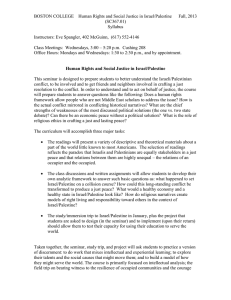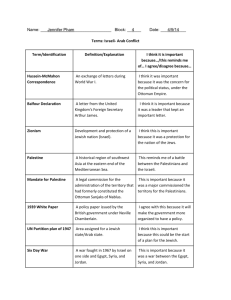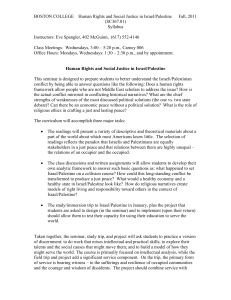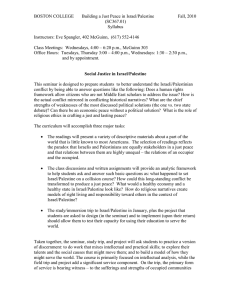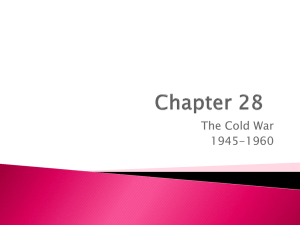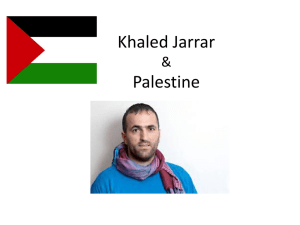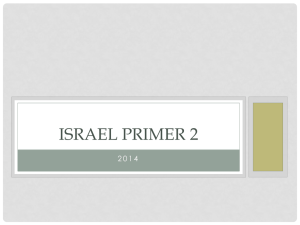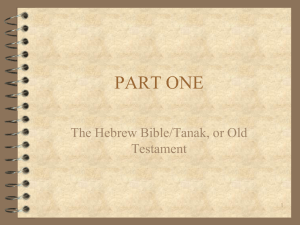BOSTON COLLEGE Human Rights and Social Justice... (SOCY3367.01) Syllabus
advertisement
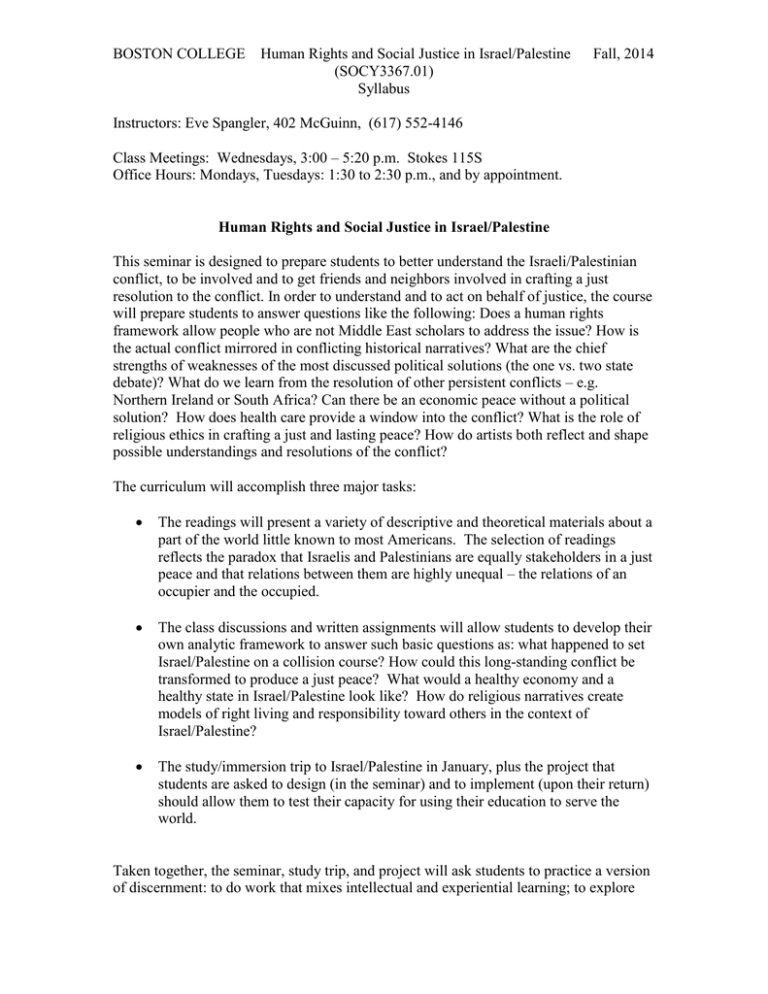
BOSTON COLLEGE Human Rights and Social Justice in Israel/Palestine (SOCY3367.01) Syllabus Fall, 2014 Instructors: Eve Spangler, 402 McGuinn, (617) 552-4146 Class Meetings: Wednesdays, 3:00 – 5:20 p.m. Stokes 115S Office Hours: Mondays, Tuesdays: 1:30 to 2:30 p.m., and by appointment. Human Rights and Social Justice in Israel/Palestine This seminar is designed to prepare students to better understand the Israeli/Palestinian conflict, to be involved and to get friends and neighbors involved in crafting a just resolution to the conflict. In order to understand and to act on behalf of justice, the course will prepare students to answer questions like the following: Does a human rights framework allow people who are not Middle East scholars to address the issue? How is the actual conflict mirrored in conflicting historical narratives? What are the chief strengths of weaknesses of the most discussed political solutions (the one vs. two state debate)? What do we learn from the resolution of other persistent conflicts – e.g. Northern Ireland or South Africa? Can there be an economic peace without a political solution? How does health care provide a window into the conflict? What is the role of religious ethics in crafting a just and lasting peace? How do artists both reflect and shape possible understandings and resolutions of the conflict? The curriculum will accomplish three major tasks: The readings will present a variety of descriptive and theoretical materials about a part of the world little known to most Americans. The selection of readings reflects the paradox that Israelis and Palestinians are equally stakeholders in a just peace and that relations between them are highly unequal – the relations of an occupier and the occupied. The class discussions and written assignments will allow students to develop their own analytic framework to answer such basic questions as: what happened to set Israel/Palestine on a collision course? How could this long-standing conflict be transformed to produce a just peace? What would a healthy economy and a healthy state in Israel/Palestine look like? How do religious narratives create models of right living and responsibility toward others in the context of Israel/Palestine? The study/immersion trip to Israel/Palestine in January, plus the project that students are asked to design (in the seminar) and to implement (upon their return) should allow them to test their capacity for using their education to serve the world. Taken together, the seminar, study trip, and project will ask students to practice a version of discernment: to do work that mixes intellectual and experiential learning; to explore BOSTON COLLEGE Human Rights and Social Justice in Israel/Palestine (SOCY3367.01) Syllabus Fall, 2014 their talents and the social causes that might move them; and to build a model of how they might serve the world. The course is primarily focused on intellectual analysis; the field trip on bearing witness to the resilience of occupied communities and the courage and wisdom of dissidents; and the project on learning to change the world for the better. The project should combine service with intellectual analysis; it is designed to test students’ capacities for thinking strategically and acting effectively to change the world. My assumption (following the distinction proposed by historian Richard Flacks) is that BC students will aspire to more than making a living; they will want to make history. This course is an opportunity to explore the possibility of making a difference. A human rights perspective, broadly construed, provides the ethical spine of the course. Human rights include both freedom from state interference in our lives, and also freedom to live in peace and safety and to develop oneself, one’s family, and community to be the best they can. In the first section of the course, we will be exploring the most widely used human rights framework, asking whether the standards enunciated in such documents as the Universal Declaration of Human Rights are indeed universal, how much they may be tainted by neo-colonialist intentions, if they need to be culturally inflected, how they relate to religious teachings, and how a human rights perspective might inform our understanding of the Israel/Palestine conflict. Using a human rights perspective, we will examine the historic background of the current situation. In this process, we shall discover the profound impact of narratives on shaping our sense of past, present, and future. In many ways, the Israeli-Palestinian conflict is being waged through contradictory narratives competing for support from the United States, the United Nations, and others. While reading both Palestinians (Karmi, Jawad, Masalha,) and Israelis (Morris, Pappe, Segev, Rogan and Shlaim, Kimmerling and Migdal), students should be asking themselves: “What really happened here?” remembering, with Thomas Kuhn, that narratives frameworks have the power to organize attention to facts; and remembering, too, that such narratives operate within a field of unequal power. We will explore the power of narrative by comparing the principle metaphors that prevail in the field. Students will examine the empirical adequacy of “Israeli self-defense,” “apartheid,” “genocide, ” and “ethnic cleansing/sociocide” as organizing frameworks for understanding the conflict. Next, we will focus on models of conflict transformation and peace-making, especially as developed by Nadim Rouhana and John Paul Lederach (as discussed by Gawerc). We will be asking how the actions of grass roots activists, NGOs, and states could be aligned to further the transformation of this heretofore intractable conflict. A sustained, just peace in Israel/Palestine depends also on the development of a robust economy or economies. To study past and possible future economies in the region, we will be looking at the historic work of Alexander Scholch who documents an industrious and prosperous 19th century Palestine. From there we will look at trajectories of de- BOSTON COLLEGE Human Rights and Social Justice in Israel/Palestine (SOCY3367.01) Syllabus Fall, 2014 development (Roy), labor policy (Farsakh) and business development (Zeveloff, Avishai). On the Israeli side, we will consider Friedman’s analysis of Israeli capitalism and the alternative views of Klein and Halper, who emphasize the degree to which Israeli capitalism relies on militarism as its engine of growth. The question for this section is whether an economic peace can operate in the absence of a political solution. Finally, having laid a foundation for understanding, the last section of the course allows students to chose a focus for their own learning and teaching to their fellow students. Students may chose between a focus on religious narratives: For students choosing to focus on religion, we will not be interested in the often described and seemingly contradictory land claims found in the Old Testament and the Kor’an. Instead, we will be asking: what ideas do each of the major religions of the area offer about a preferred way of life, care of the world, obligations to one’s own community and “the other.” the arts (poetry, fiction, film): For students focusing on the arts, we will want to know how people living in this conflict represent it in film and fiction and how those media allow them to imagine different transformations. health care: Students studying health care will be asked to focus on public health and water issues as well as access to medical care. comparative conflict resolution: Students choosing this option should be prepared to evaluate the relative weight of economic measures, armed struggle and emigration as elements in resolving the South African and Northern Ireland conflicts. Requirements A schedule of assignments and dates is attached separately. Students will be REQUIRED to attend classes, to participate in class discussions and organized presentations, and to write eight short (3-5 pp.) reflection papers that integrate intellectual learning and a broader sense of discernment about the world. By the end of the semester, for their final paper, students are asked to prepare a project prospectus outlining what they particularly want to accomplish during the field trip and how they propose to use their knowledge and experience to promote Israel/Palestine focused social justice work upon their return. ABSOLUTELY NO LATE WORK WILL BE ACCEPTED FOR CREDIT UNLESS AN EXTENSION HAS BEEN GRANTED BY ME BEFORE THE DUE DATE OF THE ASSIGNMENT. BOSTON COLLEGE Human Rights and Social Justice in Israel/Palestine (SOCY3367.01) Syllabus Fall, 2014 Assignment sheets will be distributed separately. Your final grade will be computed as follows: 8 essays @ 8% each = 64% class participation = 25% Project prospectus = 11% Readings are available in the bookstore, via the internet, and through the library’s on-line reserve system. Academic Integrity Academic integrity is a standard of utmost importance in this class. Guidelines for academic integrity in written work are posted on the Boston College website at: http://www.bc.edu/offices/stserv/academic/resources/policy/#integrity. If you have any questions pertaining to the academic integrity guidelines, please come and talk with me or with the teaching assistant. If you are caught violating Boston College’s policies on academic integrity, you will receive a failing grade for the assignment and the appropriate Dean will be notified in accordance to the rules set forth by Boston College. The Dean’s position on academic integrity is this: Boston College values the academic integrity of its students and faculty. It is your responsibility to familiarize yourself with the university’s policy on academic integrity: http://www.bc.edu/offices/stserv/academic/resources/policy/#integrity. If you have any questions, always consult your professor. Violations of academic integrity will be reported to your class dean and judged by the academic integrity committee in your school. If you are found responsible for violating the policy, penalties may include a failing grade as well as possible probation, suspension, or expulsion, depending on the seriousness and circumstances of the violation. Disability Rights If you are a student with a documented disability seeking reasonable accommodations in this course, please contact Kathy Duggan, (617) 552-8093, at the Connors Family Learning Center regarding learning disabilities, or Paulette Durrett, (617) 552-3470, in the Disability Services Office regarding all other types of disabilities. BOSTON COLLEGE Human Rights and Social Justice in Israel/Palestine (SOCY3367.01) Syllabus Fall, 2014
